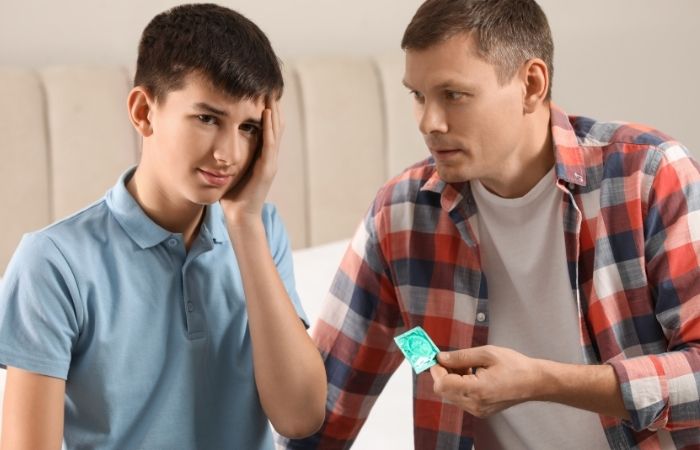Why the STD Conversation Matters More Than Ever
Teenagers are dealing with more sexual health risks than ever before:
- STDs are rising fast in people aged 15–24, including chlamydia, gonorrhea, and syphilis.
- Most infections have no symptoms, meaning your teen could be infected without even knowing it.
- Many still believe myths like “you’ll know if someone has an STD” or “oral sex is safe sex.”
And here’s the part most parents miss: your teen wants to know what’s real, but they want it from someone who won’t panic.

People are also reading: Do I need to test again even if I felt fine after treatment?
When Should You Talk to Your Teen About STDs?
The short answer? Earlier than you think. And more than once. You don’t need to wait for a red flag or a dramatic reveal. Here’s when it’s smart to bring it up:
- Before their first relationship. Set a foundation early for safe and respectful decision-making.
- When they start dating. Introduce topics like testing, boundaries, and protection.
- After breakups. A nonjudgmental moment to talk about emotional and physical safety.
- When STDs make headlines. Use news or celebrity gossip to casually start a deeper convo.
Don’t wait for them to come to you. They likely won’t.
How to Actually Say the Hard Stuff
You don’t need a script, but it helps to know what works (and what doesn’t).
DO say
“I know this is awkward, but I want you to have real info, not just rumors.”
“You can always talk to me, even if you’re scared or unsure.”
“Getting tested is something smart people do, it doesn’t mean anything bad about you.”
DON’T say
“Are you having sex?!” (Interrogation shuts down honesty.)
“You better not be doing anything stupid.” (Shame kills trust.)
“You’re too young to worry about this.” (Reality check: they already are.)
Check Your STD Status in Minutes
Test at Home with Remedium7-in-1 STD Test Kit

 For Men & Women
For Men & Women Results in Minutes
Results in Minutes No Lab Needed
No Lab Needed Private & Discreet
Private & DiscreetOrder Now $129.00 $343.00
For all 7 tests
What If They Drop a Bomb: “I Think I Have Something”
This is the moment most parents dread. Your teen looks you in the eye and says, “Something’s wrong down there.” Or worse, “I think I caught something.” Your reaction in that moment matters more than anything you say after.
Here’s how to respond (even if you’re freaking out inside)
Pause. Breathe. Soften your face: Your body language will say more than your words. Try to show calm, even if you’re panicking.
Say this: “Thank you for telling me. That took a lot of courage.”
Ask this: “Do you want me to help you figure out testing, or do you want to look into it on your own?”
Never say: “Who were you with?” or “How could you let this happen?”
Those questions create fear, not safety. You can ask for more info later, after care comes first.
At-Home Testing: A Lifeline for Teens (And Their Parents)
Many teens are afraid of clinics. They don’t want to be seen. They don’t want a lecture. They don’t want someone putting things “in them.” That’s where at-home tests come in.
Why at-home testing works for teens
- It’s private. No waiting rooms. No front-desk judgment.
- It’s fast. Most results come in days.
- It’s empowering. Teens take control of their own health.
Recommended option for anxious teens:
The 6-in-1 STD At-Home Rapid Test Kit covers the most common STDs, chlamydia, gonorrhea, syphilis, HIV, hepatitis, and more, with no prescription or clinic visit needed. Discreet shipping. Easy instructions. No shame. Offer it as an option, not an ultimatum. Say:
“There’s a test you can do at home if that feels easier. If you want, I can help order it.”
How to Keep the Conversation Going
Sex talks shouldn’t be once-a-year events. Just like we teach seatbelts and sunscreen on repeat, we need to teach STI prevention as an evolving conversation. Here’s how to keep it open:
- Follow up with resources. Share a YouTube explainer or a TikTok from a doctor they trust.
- Be honest about your own awkwardness. “I didn’t get good info about this stuff when I was younger either.”
- Revisit it during life milestones. New school year. New relationship. New experiences. All natural entry points.

People are also reading: Do silent STDs always cause infertility?
FAQs
1. When is the best age to talk to my teen about STDs?
Start early, ideally before they become sexually active. Age 12–14 is a common starting point, but it’s never too late.
2. What if my teen gets uncomfortable or shuts down?
That’s normal. Don’t push. Say, “It’s okay if you don’t want to talk right now. I’m always here when you’re ready.”
3. Should I bring up specific STDs like HIV or herpes?
Yes, in age-appropriate ways. Use clear, non-scary language. Focus on prevention, not fear.
4. What if my teen doesn’t believe they need to test?
Explain that many STDs show no symptoms, and testing is about responsibility, not judgment or punishment.
5. How often should teens get tested for STDs?
Once a year if sexually active, or more often with new partners or unprotected sex. HPV vaccination is also crucial.
6. What if my teen tells me they’re scared they have an STD?
Stay calm. Thank them for telling you. Offer emotional support and testing options, preferably private and pressure-free.
7. Can my teen get tested without me knowing?
In many regions, yes. Teens can access confidential testing starting around age 14–16, depending on local laws.
8. How do I talk to my LGBTQ+ teen about sexual health?
Ask what they need and listen. Use inclusive language. Many LGBTQ+ teens get skipped in sex ed, your support matters more than ever.
9. What if I don’t have all the answers?
You don’t need to. Be honest. Say, “I don’t know, but let’s find out together.” That models trust and curiosity.
10. Where can I find testing my teen can do at home?
You can order discreet, accurate tests like the 6-in-1 STD At-Home Rapid Test Kit. It includes all major infections and can be done without leaving the house.
Say It Anyway
Here’s the truth: your teen is already hearing things about STDs, from TikTok, from school, from friends. You can’t control what they hear. But you can be the voice they trust the most. They don’t need a lecture. They need a lifeline.
Start the conversation. Stay open. Make testing normal. And if you want to offer a low-stress, low-drama way to protect their health, try the Complete 8-in-1 STD At-Home Rapid Test Kit. Because the moment they wonder, “Am I okay?” they deserve an answer. And you deserve to be the person they turn to.
Sources
1. MyHealthfinder (U.S. HHS) – Talk with Your Teen About Preventing STIs
2. CDC – Healthy Youth Parent Resources: Conversation Tips About STIs
3. Harvard Health Blog – What Parents Want Teens to Know About STIs
4. American Sexual Health Association – Be an ‘Askable’ Parent About Sexual Health
5. Planned Parenthood – How to Talk with Your Teen About STDs










